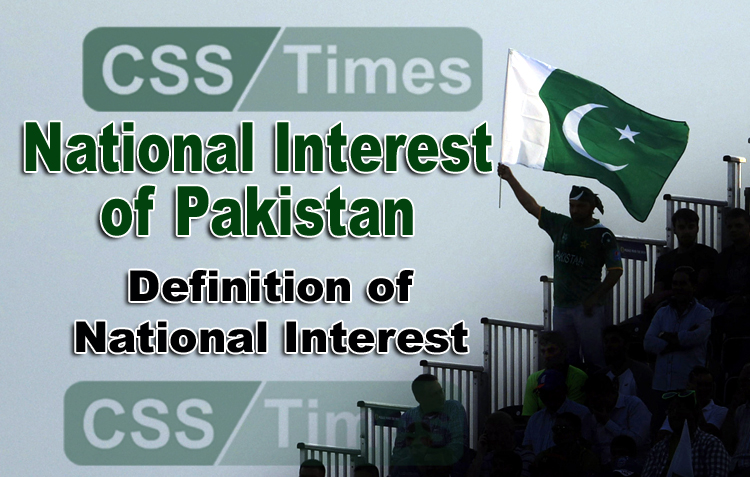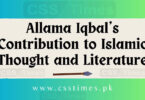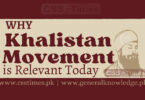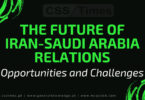National Interest of Pakistan | Definition of National Interest (Part-I)
Hans Morgenthau defines the national interest as:
“The interest of a nation as a whole held to be an independent entity separate from the interests of subordinate areas or groups and also of other nations or supranational groups ; any foreign policy which operates under the standard of the national interest.”
What is the national interest? Who frames it? How is it framed? Does it take sufficient account of the interests of the people? What are the answers to these questions in the case of Pakistan?
Let us go back to the Pakistan Movement. When did it begin? What was it for? The answers are not always so clear or simple. What we do know is that the Muslim League was established in Dhaka in 1906 to safeguard the political rights and interests of the Muslims of British India. In 1930 Allama Iqbal addressed the Allahabad session of the Muslim League. He made the case for the Punjab, NWFP, Sindh and Balochistan to be amalgamated into a single state. He felt that “the life of Islam, as a cultural force in India very largely depends on its centralization in a specified territory.” Did this mean a separate country? Iqbal said he wanted the” free development” of Islamic culture which was practically impossible under a unitary government dominated by nationalist Hindu politicians. Did that mean a more decentralized federal structure would be suitable? But then he adds “the problem of India is international, not national.” Is this a multinational problem within India or does it necessitate separate nations? In a letter addressed to the Quaid-e-Azam dated 21 June 1937, Iqbal suggested a separate federation of Muslim provinces was the only way to secure a peaceful India and save Muslims from the domination of non-Muslims. He posed the question: why should the Muslims of the North West and Bengal not be considered nations with the same right of self-determination, just as other nations in India, and outside India? This, if anything, was a forerunner of the Cabinet Mission plan of 1946 which was ultimately and conditionally accepted by the Muslim League, but rejected by the Indian National Congress. National Interest of Pakistan
We all know that the word Pakistan was coined by Ch. Rahmat Ali in his pamphlet Now or Never in 1933. He thought in terms of a Pakistan in the North West, a Bang-e-Islam in Bengal and Assam, and an Usmanistan for Hyderabad State in the South. The Quaid did not believe his proposal to be practical. However, Ch. Rahmat Ali felt the creation of Pakistan within its 1947 borders had sabotaged the future of the then 100 million Muslims living in India and he called it the blackest day for all the Muslims of the subcontinent. National Interest of Pakistan
Just before Independence, the Quaid met a delegation of Indian Muslims and told them frankly “the Muslims of India would go through a number of ordeals, sufferings and sacrifices. Their future will remain dark for some years to come and thick clouds will be hanging over them.” He asked them to display courage find the required leadership and preserve their identity. He advised them to avoid conflict with the majority community and demonstrate through their merit that they could not be ignored. Regarding loyalty, the Quaid did not mince his words. They had to be loyal to their country which was India. He said “just as I want every Hindu in Pakistan to be loyal to Pakistan, so do I want every Muslim in India to be loyal to India. There is no other alternative.” Subsequently, the historic speech of the Quaid on 11 August 1947 at the inauguration of Pakistan’s Constituent Assembly reiterated the same sentiment. He said “you may belong to any religion or caste or creed – that has nothing to do with the business of the state. We are starting with this fundamental principle that we are all citizens and equal citizens of one State.” National Interest of Pakistan
This was the ideology of the Founding Father of Pakistan. Without saying so, the Quaid had made abundantly clear that the two nation theory which was central to the Pakistan Movement had no role within an independent Pakistan. This was the basis on which all national policy including foreign policy – was supposed to be formulated. However, Pakistan was born into a sea of challenges. It was confronted with hostility. It was overwhelmed by the slaughter and displacement of millions that accompanied the Partition, and which created an enduring legacy of bitterness on both sides of the border. Moreover, no one anticipated that the Kashmir dispute would become a permanent sore and the cause of an unending cycle of conflict between the two countries adding to the bitterness, and poisoning the context in which so many other bilateral issues had to be addressed. Being the smaller and more vulnerable state, Pakistan became a security oriented state instead of becoming what the Quaid wanted, a development oriented state. The retention of the two nation theory under the slogan of Muslim nationalism, and with it separate electorates, was absurdly seen as some kind of psychological reassurance against re-absorption into India. It simultaneously demonstrated a lack of confidence in Pakistan’s nationalism and set up an impediment against the development of a healthy nationalism based on a respect for diversity and respect for equal minority rights. National Interest of Pakistan
Worst of all, the Quaid departed the scene barely a year after the birth of Pakistan. There was no one of the required caliber to lead the country and develop the Muslim League into a people’s party. The Quaid, as mentioned, had asked the Muslims of India to develop the required leadership to meet their challenges in post-partition India. But, ironically, it was Pakistan after the Quaid that could not develop the leadership he hoped for. India, on the other hand, had the benefit of Nehru’s leadership for 17 years after independence and he was able to lay the foundations of a development state. It must also be admitted that while the Congress party was infected by the virus of anti-Muslim communalism it was politically a more progressive party than the Muslim League whose mass base was largely left behind in India. National Interest of Pakistan
Our foreign policy was accordingly impacted. The feudal class of West Pakistan much of which had until the very last moment refused to have anything to do with the Pakistan Movement or the Quaid, the refugee bureaucrats who came from India with better education and qualifications, the military which rose in significance because of the challenges to national security, and the religious classes which had also opposed Pakistan and had no respect for the Quaid’s ideology which they saw as western and un-Islamic, came together to form a political elite based on a mutual accommodation of interests at the expense of the people as a whole. This, of course, happens everywhere. But given Pakistan’s traumatic birth, its infancy and fragility, and the loss of its beloved and irreplaceable leader, the anti-people ruling elite proved very costly indeed. India’s short-sighted and duplicitous approach towards
Pakistan played straight into the hands of Pakistan’s cynical elite. This of course suited India just fine.
National security, not development, became the national priority. Development came to rely on external assistance as much as on mobilizing internal resources. Foreign policy had to facilitate these national political and economic strategies by facilitating the agendas of external benefactors and mobilizing external resources on the basis of convincing these benefactors that Pakistan was a more reliable and valuable ally than India – a mission that at best could achieve contingent and temporary success. Our foreign policy while managed by exceptionally gifted and committed individual diplomats was limited by these narrow elite determined and inefficient national priorities.
A new post-partition Pakistan ideology was invented largely by those who had little or nothing to do with the Pakistan Movement. The national priorities were those set by a soft praetorian elitist state that dressed itself up as a revived Salahaddin Ayyubi state. These priorities were, of course, set without any reference to available national resources or the priority needs of the people. Moreover the economic elite wanted a free ride in terms of exemptions from paying taxes, subsidies and protection from any kind of competition. The defense elite garnered the lion’s share of domestic resources and also wanted “external equalizers” to counter the greater size and resources of our major adversary, with whom perpetual enmity became a badge of honor and identity. When the results proved less than satisfactory, our foreign policy and diplomats were conveniently blamed.
Our foreign and defense policies were required to be romantic, heroic and successful on the basis of historic delusions and myths rather than rational analyses and any substantial investment in physical and human resources. The obvious fact that in the modern era standing peasant armies do not win conventional military victories was deliberately ignored despite all the war gaming that was supposedly going on. In fact, the case for rational evaluation was often denounced as cowardly, lacking in faith and western influenced. These arguments were not just silly. They were dishonest and dissembling. Meanwhile the people and the smaller provinces were progressively alienated by the demands of an ideology – couched in patriotic and religious terms – in the formulation of which they were not consulted and on behalf of which they saw their resources and opportunities for development being plundered. This led ultimately to the humiliating tragedy of military defeat and the loss of more than half our population – and the shameless betrayal of the vision and lifework of Quaid-e-Azam and Allama Iqbal.
Read also: China-Russia Relations and the US-China-Russia Triangle
As a result, the basis of our foreign policy changed from the idle boast of a thousand year war with India to a desperate struggle to pick up the shattered pieces of what was left of Pakistan. This transition was brilliantly managed by Zulfikar Ali Bhutto. We upgraded our relations with the Islamic world, negotiated from an empty hand to get the Simla Agreement and secure the maximum breathing space for building a new Pakistan, and began searching for a new equalizer vis -a -vis India. The electoral victory of the PPP under Bhutto in 1970 empowered the lower classes under the slogan of “roti, kapra, makaan which indicated what the true ideology and agenda of the people was. They were already Muslims. They did not need to be repeatedly converted. Economic and administrative reforms were undertaken. In foreign policy an eastward and leftward orientation was imparted to bring us into line with the Non-Aligned Movement although this did not sit entirely well with our courting the Sheikhs of Arabia.
Our shattered national image which sprang not just from defeat but also from our treatment of our own compatriots in East Pakistan began to acquire a positive and progressive image. Our relations with China were further strengthened because it feared the rise of a triumphant India becoming more assertive and seeking revenge for its 1962 defeat with western support. But this could not entirely replace the effective loss of the US as a supposed equalizer vis -a -vis India, especially after India’s “Smiling Buddha” peaceful nuclear implosion of 1974. We decided there was no alternative to seeking a nuclear equalizer even if our industrial base was not sufficient to support the effort. Bhutto was quoted as having said “we will eat grass” if necessary to obtain nuclear weapons capability, although there was little danger of our comfortable classes being reduced to such a plight. The land reforms turned out to be bogus. The nationalization of banks and medium sized enterprises was an exercise in the assertion of power rather than genuine socio-economic reform. The tax base remained as exiguous as ever. Pakistan remained an elitist and soft praetorian state, and never made the transition to a people’s development state capable of taking and implementing tough decisions on behalf of the people’s interests. Our foreign policy reflected these realities.
Check also: International Relations MCQs
The fall of Bhutto inaugurated the Islamization of Pakistan – a misnomer because it was Islam in the service of military dictatorship and its cohorts, and not the state and people in the service of Islam. Islam the world’s most enlightened, humane and rational of religious traditions had to be distorted and degraded in order to disguise this betrayal of our ultimate set of values – the values that underlay the Pakistan Movement and the Quaid’s last messages to his people. Military dictatorship and intelligence agencies began to formulate the essential thrust of national policies including foreign policy. After the judicial murder of Zulfikar Ali Bhutto in 1979, Zia was internationally despised and isolated. He might not have lasted long. But the Iranian Revolution and far more importantly the Soviet invasion of Afghanistan saved his regime. In fact he became the center of gravity for the effort to defeat the Soviet Union in Afghanistan. A wonderful opportunity for the so-called Islamization and militarization of the state and society was provided, and availed of. The international community led by the US and the rest of the west rushed to Zia’s support as they later did to that of another military dictator without giving a damn about how this would impact on the balance between rational and irrational political agendas and the welfare of the people of Pakistan. They used Pakistan and threw it away when no longer needed allowing all the rot to fester and poison the future of the country. Democratic forces have never recovered since. As a result, we now fluctuate between military dictatorship and kleptocracy, and call it a learning process in democratic governance. In this milieu, the conduct of foreign policy which is a technical/non-ideological art or skill was marginalized in terms of contributing to decision making within its own sphere of competence and responsibility, and was used as an instrument and as window dressing. National Interest of Pakistan
From the above we can see that the national interest has been defined by those in control of articulating the ideology of Pakistan who also exercise power over the use and allocation of its resources. This is seldom done in the national interest. In fact it has involved the deliberate and disastrous abandonment of the project to build the Quaid’s Pakistan for which the Pakistan Movement struggled. The great English writer Samuel Johnson said patriotism is the last refuge of the scoundrel. Patriotism and religion have both been misused in a similar way in Pakistan. The people, however, have developed greater awareness and consciousness over the decades. But they are not yet sufficiently organized to significantly impact the substance of national and foreign policies. The leadership of Pakistan is largely agreed on trying to keep the people out of the loop as much as possible through distractions of every kind. Democracy as political theater in the shape of bitter fighting among the major parties is a favorite stratagem. The people, of course, are not fooled. But they are not yet sufficiently aware of their potential organized strength. The souls of the Allama and the Quaid must remain restless for some time to come. It is for the people to ensure that the day will come when they finally rest in peace. National Interest of Pakistan








[…] Check Also: National Interest of Pakistan | Definition of National Interest (Part-I) […]